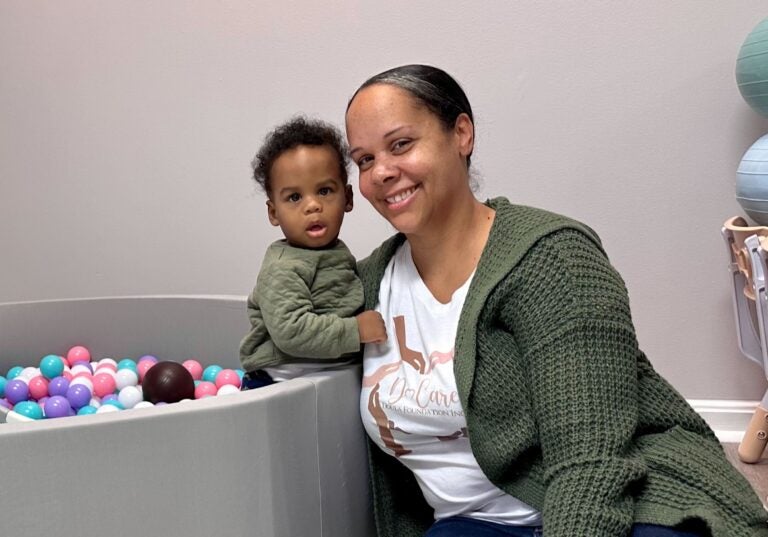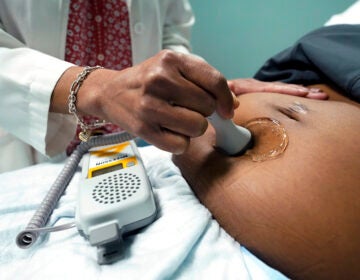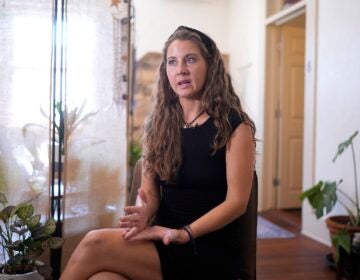New Dover health resource center aims to tackle Delaware’s high Black maternal mortality rate
The state’s Black maternal mortality rate is more than double what it is for white or Hispanic residents. The Do Care Doula Foundation aims to change that.

Erica Allen, Executive Director of the Do Care Doula Foundation, engaging with her son in the children's play area. (Johnny Perez-Gonzalez/WHYY)
From Philly and the Pa. suburbs to South Jersey and Delaware, what would you like WHYY News to cover? Let us know!
The racial disparity in maternal mortality in Delaware is significant. The rate for Black residents is 36%, more than twice as high compared to white or Hispanic mothers.
Nationally, Black mothers have also faced a disproportionately high maternal mortality rate. In 2021, the rate reached nearly 70 deaths per 100,000 live births, more than 2.5 times higher than white mothers, according to the Centers for Disease Control and Prevention.
Similarly, infant mortality rates mirror these disparities.
Addressing these issues requires additional support for marginalized groups, and that’s where the Do Care Doula Foundation Inc. comes in. Their new center in Dover will be a cornerstone in providing crucial assistance to these communities.
“It’s an extension of the nonprofit’s mission of decreasing birth disparities within the Black and brown community,” said Do Care’s executive director Erica Allen. “We’ve done a lot of community outreach events, virtual if you will, but we are now going to have a footprint within the community and be able to expand and provide more services by having an actual brick-and-mortar location.”
“Initially, the way we started was we just began training doulas, actually. So doulas being birth and postpartum support persons that are non-medical,” she added.
The group started delivering services virtually and offering help on location in 2021. The new center will help expand services to include a diaper bank, basic needs pantry, menstrual supplies, support groups, fitness classes, childbirth and lactation education, BIPOC doula training and development, and events featuring giveaways of essential baby items.
Allen aims to fill the gap in services for women in Sussex and Kent counties, striving to be a one-stop shop for comprehensive support.
“I am eight months postpartum myself, and I went through the experience. I really realized that there is a need for this,” she said. “That’s part of the drive, for making sure that we have so many different things that are offered here because the communities definitely lack a lot of funding and a lot of resources.”
The core of their services revolves around the three-day doula training. However, securing funding posed a challenge.
“I feel like that’s one of the things that we have been striving to increase awareness and knowledge about because a lot of people, while they may be aware of the birth disparities, they don’t understand what the presence of a doula does to help with that,” said Gabbi LaSalle, Do Care’s executive assistant and a doula herself. “That’s probably been one of the biggest hurdles with funding. Because they’re, ‘well, you’re not midwives, you’re not medical, so what exactly do you do that’s impactful as far as needing this funding.’”
Having doulas available for patients and their families is crucial not only during childbirth but also before and after. A doula’s presence is particularly important for representation, ensuring the mother’s comfort, education and advocacy.
“We are there 24/7, available to them whatever their needs are, whatever type of support they need as far as even just guiding them to resources, helping them find evidence-based research as far as different methods for childbirth or lactation things of that nature,” LaSalle said. “Also from prenatal to postpartum, we’re there with them the entire time no matter what it is or going through, what they need.”
“Being there in the delivery room with them, which is obviously the most important part of it, teaching them to advocate for themselves is the number one priority that we have within our organization,” she added.
Since 2021, the Do Care Doula Foundation has trained approximately 33 doulas. It seeks to expand and diversify its doula teams by including individuals from various cultural backgrounds, such as Latinas and Haitians.
Their services are also available to individuals covered by Medicaid.
The center will officially kick off its services starting next week.

Get daily updates from WHYY News!
WHYY is your source for fact-based, in-depth journalism and information. As a nonprofit organization, we rely on financial support from readers like you. Please give today.







